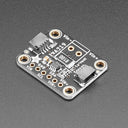INA219 High Side DC Current Sensor Breakout - 26V ±3.2A Max
by Adafruit






This breakout board will solve all your power-monitoring problems.
Instead of struggling with two multimeters, you can just use the handy INA219B chip on this breakout to both measure both the high side voltage and DC current draw over I2C with 1% precision.
Please Note: As of Sept 2022, due to the severe chip shortage, Adafruit have had to update this design to use either the INA219A or INA219B and in SOT-23 or SOIC package - whatever they are able to get on the market! The A version is ±1% total max current measurement error over the entire temp range (±0.5% max at 25*C) and the B version is ±0.5% total max current measurement error over the entire temp range (±0.3% max at 25*C). Overall functionality is otherwise the same.
Most current-measuring devices are only good for low side measuring. That means that unless you want to get a battery involved, you have to stick the measurement resistor between the target ground and true ground. This can cause problems with circuits since electronics tend to not like it when the ground references change and move with varying current draw. This chip is much smarter - it can handle high side current measuring, up to +26VDC, even though it is powered with 3 or 5V. It will also report back that high side voltage, which is great for tracking battery life or solar panels.
A precision amplifier measures the voltage across the 0.1 ohm, 1% sense resistor. Since the amplifier maximum input difference is ±320mV this means it can measure up to ±3.2 Amps. With the internal 12 bit ADC, the resolution at ±3.2A range is 0.8mA. With the internal gain set at the minimum of div8, the max current is ±400mA and the resolution is 0.1mA. Advanced hackers can remove the 0.1 ohm current sense resistor and replace it with their own to change the range (say a 0.01 ohm to measure up 32 Amps with a resolution of 8mA)
Adafruit include a 6-pin header (so you can easily attach this sensor to a breadboard) as well as a 3.5mm terminal plug so you can easily attach and detach your load.
Usage is simple. Power the sensor itself with 3 to 5VDC and connect the two I2C pins up to your microcontroller. Then connect your target power supply to VIN+ and the load to ground to VIN-. Adafruit have a detailed tutorial that will do all the gain, range and math for you - just plug and go with Arduino or CircuitPython!
As if that weren't enough, Adafruit have now also added SparkFun Qwiic compatible STEMMA QT connectors for the I2C bus so you don't even need to solder the I2C and power lines. Just wire up to your favorite micro using a STEMMA QT adapter cable. The Stemma QT connectors also mean the INA219 can be used with our various associated accessories. QT Cable is not included, but we have a variety in the shop.
TECHNICAL DETAILS
Revision History:
- As of January 29, 2021, Adafruit have updated this sensor to the STEMMA QT standard for sensors. There are now four mounting holes and two STEMMA QT connectors for plug-and-play connectivity! The schematic is the same; only the mechanical shape has changed
- As of Sept 22, 2022 - due to the severe chip shortage, Adafruit have had to update this design to use either the INA219A or INA219B and in SOT-23 or SOIC package - whatever they are able to get on the market! The A version is ±1% total max current measurement error over the entire temp range (±0.5% max at 25*C) and the B version is ±0.5% total max current measurement error over the entire temp range (±0.3% max at 25*C). Overall functionality is otherwise the same.
- Datasheet, Fritzing, and EagleCAD PCB files available in the product tutorial
- 0.1 ohm 1% 2W current sense resistor
- Up to +26V target voltage
- Up to ±3.2A current measurement, with ±0.8mA resolution
- Note: The terminal block included with your product may be blue or black.
- This board/chip uses I2C 7-bit addresses 0x40, 0x41, 0x44, 0x45, selectable with jumpers
Product Dimensions: 25.6mm x 20.4mm x 4.7mm / 1.0" x 0.8" x 0.2"
-
INA219 High Side DC Current Sensor Breakout - 26V ±3.2A Max
ADA90410% off!£7.20was £8.00
Shop with confidence – we've been serving the hobbyist electronics, Maker, and retro gaming communities since 2012.
- Satisfaction or refund guarantee
- Worldwide shipping via mail or courier
- 57,000+ customer reviews
- Secure website and payments